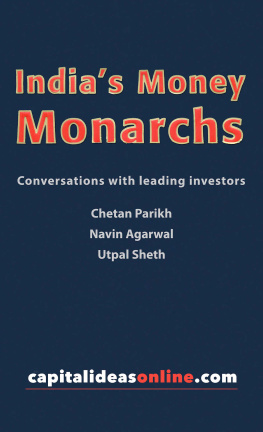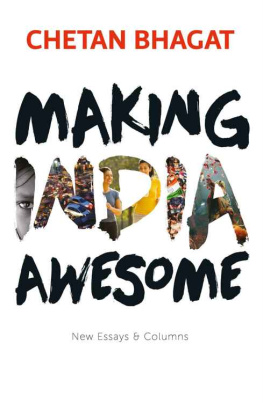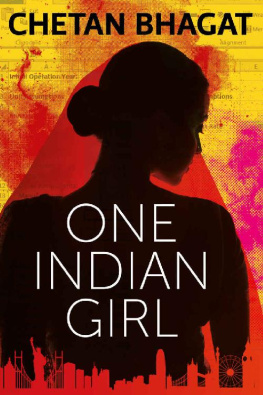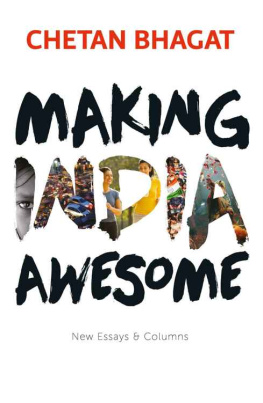Chetan Parikh - India’s Money Monarchs: Conversations with leading investors
Here you can read online Chetan Parikh - India’s Money Monarchs: Conversations with leading investors full text of the book (entire story) in english for free. Download pdf and epub, get meaning, cover and reviews about this ebook. year: 2021, publisher: Cerebrum Online Pvt. Ltd., genre: Business. Description of the work, (preface) as well as reviews are available. Best literature library LitArk.com created for fans of good reading and offers a wide selection of genres:
Romance novel
Science fiction
Adventure
Detective
Science
History
Home and family
Prose
Art
Politics
Computer
Non-fiction
Religion
Business
Children
Humor
Choose a favorite category and find really read worthwhile books. Enjoy immersion in the world of imagination, feel the emotions of the characters or learn something new for yourself, make an fascinating discovery.
- Book:India’s Money Monarchs: Conversations with leading investors
- Author:
- Publisher:Cerebrum Online Pvt. Ltd.
- Genre:
- Year:2021
- Rating:5 / 5
- Favourites:Add to favourites
- Your mark:
- 100
- 1
- 2
- 3
- 4
- 5
India’s Money Monarchs: Conversations with leading investors: summary, description and annotation
We offer to read an annotation, description, summary or preface (depends on what the author of the book "India’s Money Monarchs: Conversations with leading investors" wrote himself). If you haven't found the necessary information about the book — write in the comments, we will try to find it.
Chetan Parikh: author's other books
Who wrote India’s Money Monarchs: Conversations with leading investors? Find out the surname, the name of the author of the book and a list of all author's works by series.
India’s Money Monarchs: Conversations with leading investors — read online for free the complete book (whole text) full work
Below is the text of the book, divided by pages. System saving the place of the last page read, allows you to conveniently read the book "India’s Money Monarchs: Conversations with leading investors" online for free, without having to search again every time where you left off. Put a bookmark, and you can go to the page where you finished reading at any time.
Font size:
Interval:
Bookmark:
Indias Money Monarchs
Conversations with leading investors
Chetan Parikh
Navin Agarwal
Utpal Sheth
capitalideasonline.com
Copyright 2005 Cerebrum Online Pvt.Ltd
First published in India in 2005 by Cerebrum Online Pvt.Ltd. 58, Maker Towers F, Cuffe Parade Mumbai 400 005 Tel: 91-22-2218 1985/2218 1986 Fax: 91-22-2218 1986 www.capitalideasonline.com Text Cerebrum Online Pvt. Ltd. All rights reserved under international copyright Conventions. No part of this book may be reproduced or transmitted in any form or by any means, electronic or mechanical, including photocopy, recording or any other information storage and retrieval system, without prior permission in writing from the publisher. ISBN: 81-7525-610-9 Designed by Paulomi Shah Printed by Jak Printers, Mumbai
Preface
Investing as a serious discipline engages the minds and the hearts of the very best. We have attempted to understand from some of Indias finest money managers, who we have spoken to, their thought processes which range from a continuum that spans deep value to momentum. These interviews have been conducted over a period of three years. Whilst stock picks change all the time, investment philosophies rarely do.
We took this project up because we knew that the Indian equity markets had certain unique nuances. Having had significant investment success in India ourselves, we felt that we could capture something more incisive when conducting these interviews. Love, not lucre, drove us to making significant time commitments to an endeavour which we believe is the first of its kind in the Indian capital markets.
These interviews have been conducted on behalf of capitalideasonline.com. Capitalideasonline.com has been a site promoted with a mission to further investor education and build a global investor community.
The site has been referred to by
www.beartopia.com
www.smithers.co.uk
www.financialsense.com
www.therealwarrenbuffett.com
and the Berkshire Hathaway forum, the only Indian site to have gained that distinction.
We hope you enjoy and learn from these interviews as much as we have. We wish to thank all these interviewed for their time as also Ms. Paulomi Shah, Mr. Shenvi and Mr. Jagat for their valuable inputs.
Chetan Parikh
Navin Agarwal
Utpal Sheth
Preface to the kindle edition
Chetan Parikh
Navin Agarwal
Utpal Sheth
October 2021
Thoughts on Investing
At the Wharton School from which I graduated a long time ago, I was taught about efficient markets. When I returned to the real world, I paid more tuitions to Mr. Market then I ever did to Wharton (and continue doing so). I did not however take a professional interest in investing till I was told about Benjamin Graham and Warren Buffett from one of Indias wisest investors, Professor Russi Jal Taraporevala, in the late Eighties. Ever since then I have believed and attempted to practise value investing as I understood it.
I promoted Jeetay Investments Pvt Ltd. a few years ago as an advisory firm which has recently ventured into portfolio management services. Jeetay is also co-promoting Discover India Fund, a Mauritius based fund which will invest in Indian equities. The partners of Jeetay adhere to a mindset which believes in buying with a margin of safety, identifying catalysts, economic moats and competitive advantage periods and selling when intrinsic value is reached. This philosophy has been articulated by me in various pieces published in Business India and Business World. I reproduce some of them to illustrate what I have adopted as an operating philosophy of investing after having spent many years trying to understand the craft of investing.
Chetan Parikh
November 2005
Flawed Temples of Modern India
December 6 th , 2004 Business World
Economists have stated that many of Nehrus temples of modern India, the public sector units (PSU), survive only on huge donations from the state. Genuine privatisation, not just listing on the stock exchanges but transfer to private ownership, is an economic necessity and not the political luxury which it has been unfortunately reduced to.
One of the specious arguments made in favour of government ownership is public control on the production of essential goods and services. For instance, the recent statement by the Petroleum Minister only confirms that there is no free pricing of petroleum products despite the formal abolition of the Administered Pricing Mechanism. Price controls, formal or otherwise, only transfer power from free markets to politicians. History has shown that it is an egregious error.
Diocletian, the Emperor of Rome in the Late Third Century AD, first attempted to impose price controls on a large scale. Some of his predecessors had progressively debased the coinage with base metals, setting off unprecedented inflation. Since he lacked precious metals and was forced to continue issuing base metal coins as well, he tried to control inflation through price controls. It was an unmitigated disaster, despite the liberal use of the death penalty as a means of enforcement. Goods simply went into hiding or were traded in the black market.
The original argument for state involvement in industry was the promotion of the public good the idea that state-controlled industries were to generate resources for redistribution which was not possible through taxation, given the low tax base. The economic compass was set wrong. The redistribution that has taken place is pointed in the opposite direction from customers and taxpayers to managers and employees of PSUs due to poor productivity and consequent losses.
This is a throwback to the Dark Ages. The private property that existed in those early agricultural societies was seldom at the bottom of the social pyramid. The primitive organisation of property that evolved in those times increased the chances of survival but at the cost of forgoing the opportunity to accumulate capital and rise in the economic system.
Anthropologists and social historians describe this as closed village. The households in closed village joined together to operate not in the open marketplace but in a closed system where all economic transactions of the village tended to be struck with a single monopolist usually the village chief. Part of the crop was given to the landlord in exchange for seed. At the cost of buying at monopolised prices and selling cheaply, the peasants increased their chances of survival if the harvest failed. The feudal system that arose was a result of this risk-averse behaviour among groups that operated along the margins of survival. The public sector is reminiscent of that hoary age of feudalism, and is just as anachronistic.
Government ownership also increases the probability of public sector enterprises losing value over time. The private sector is more equipped through the discipline of the capital markets to take the risks and expenses of innovation without which enterprises can become technological backwaters. Operating in oligopolistic markets and protected from foreign competition by ministerial whims and fancies, many public sector enterprises trace a form of evolution which strikingly resembles the tendency of leaving things isolated from competition on lush islands to evolve into giant and often grotesque creatures. Markets are no different from ecosystems, and conditions must be created where only the fittest survive.
Next pageFont size:
Interval:
Bookmark:
Similar books «India’s Money Monarchs: Conversations with leading investors»
Look at similar books to India’s Money Monarchs: Conversations with leading investors. We have selected literature similar in name and meaning in the hope of providing readers with more options to find new, interesting, not yet read works.
Discussion, reviews of the book India’s Money Monarchs: Conversations with leading investors and just readers' own opinions. Leave your comments, write what you think about the work, its meaning or the main characters. Specify what exactly you liked and what you didn't like, and why you think so.












